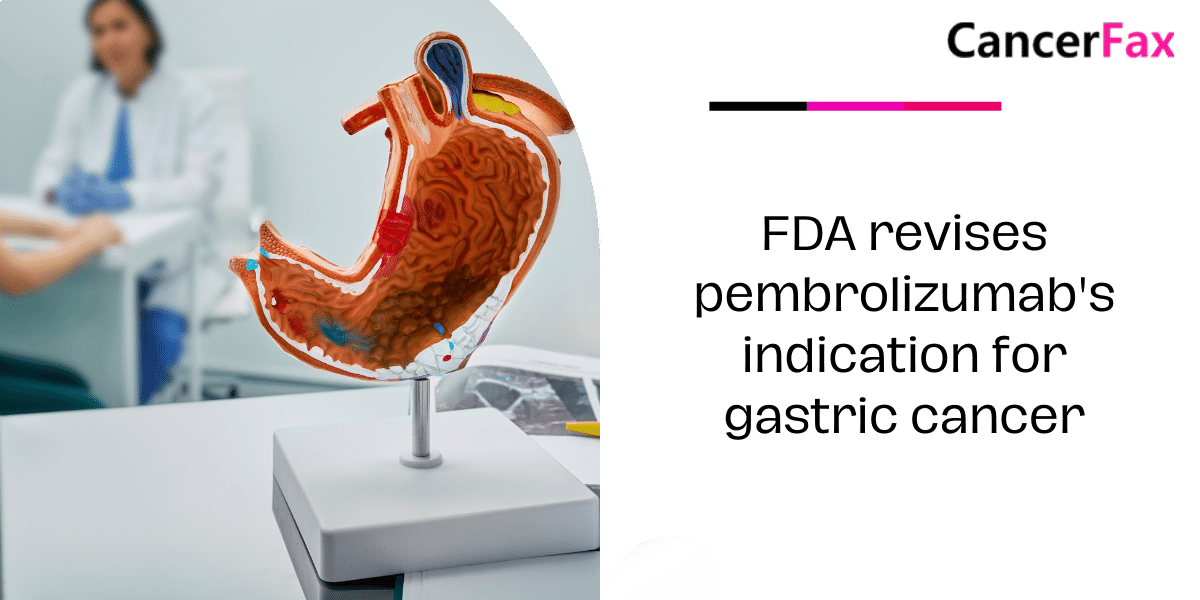The Food and Drug Administration updated the approved use of pembrolizumab (Keytruda, Merck) in combination with trastuzumab, fluoropyrimidine, and platinum-containing chemotherapy for treating HER2-positive gastric or gastroesophageal junction adenocarcinoma that is locally advanced, unresectable, or metastatic in patients who have not received prior treatment. The revised approval limits the use of this indication to patients with tumors expressing PD-L1 (CPS ≥ 1) as detected by an FDA-approved test, while still complying with accelerated approval regulations.
The FDA approved the Agilent PD-L1 IHC 22C3 pharmDx as a companion diagnostic device for identifying patients with gastric or GEJ adenocarcinoma whose tumors have PD-L1 expression (CPS ≥ 1).
The effectiveness was assessed in KEYNOTE-811 (NCT03615326), a study conducted at many centers, where patients with HER2-positive locally advanced or metastatic gastric or GEJ adenocarcinoma who had not undergone systemic therapy for metastatic illness were randomly assigned to receive either the treatment or a placebo in a double-blind manner. Patients were randomly assigned to receive either pembrolizumab 200 mg intravenously or a placebo every 2 weeks along with trastuzumab and either fluorouracil plus cisplatin or capecitabine plus oxaliplatin in a 1:1 ratio.
The primary effectiveness endpoints of KEYNOTE-811 are overall survival (OS) and progression-free survival (PFS). The approval on May 5, 2021, was granted after evaluating the interim analysis of objective response rate (ORR) and duration of response (DOR). ORR and DOR were evaluated in the initial 264 randomized participants at that time. The objective response rate (ORR) was 74% (95% CI: 66, 82) in the pembrolizumab plus chemotherapy group and 52% (95% CI: 43, 61) in the placebo plus chemotherapy group (p-value <0.0001). The median duration of response was 10.6 months (range: 1.1 to 16.5) and 9.5 months (range: 1.4 to 15.4) in the different groups.
An interim analysis of a fully enrolled trial with 698 participants showed that in a subset of 104 patients with PD-L1 CPS <1, the hazard ratios (HR) for overall survival (OS) and progression-free survival (PFS) were 1.41 (95% CI 0.90, 2.20) and 1.03 (95% CI 0.65, 1.64) respectively.
The safety profile of patients treated with pembrolizumab and trastuzumab + chemotherapy in KEYNOTE-811 was similar to the established safety profiles of trastuzumab + chemotherapy alone or pembrolizumab monotherapy.
The suggested dosage of pembrolizumab is 200 mg every 3 weeks or 400 mg every 6 weeks until disease progression, intolerable toxicity, or for a maximum of 24 months. Administer pembrolizumab before trastuzumab and chemotherapy if they are given on the same day.

Targeting FGFR4 and CD276 with CAR T-cells demonstrates a strong antitumor impact against children rhabdomyosarcoma
Chimeric antigen receptor (CAR) T-cells that specifically target Fibroblast Growth Factor Receptor 4 (FGFR4), a surface tyrosine receptor that is extensively expressed in rhabdomyosarcoma (RMS), are now undergoing clinical research. However, the effectiveness of these CAR T-cells may be hindered by tumor heterogeneity and inadequate activation. In this study, we present a method to enhance the co-stimulatory and targeting characteristics of a FGFR4 CAR through an optimization process. We substituted the hinge and transmembrane domain of CD8 as well as the 4-1BB co-stimulatory domain with the corresponding domains of CD28. The CARs produced exhibit heightened anti-tumor efficacy in multiple RMS xenograft models, with the exception of the RMS559 cell line, which is known for its aggressive nature.

